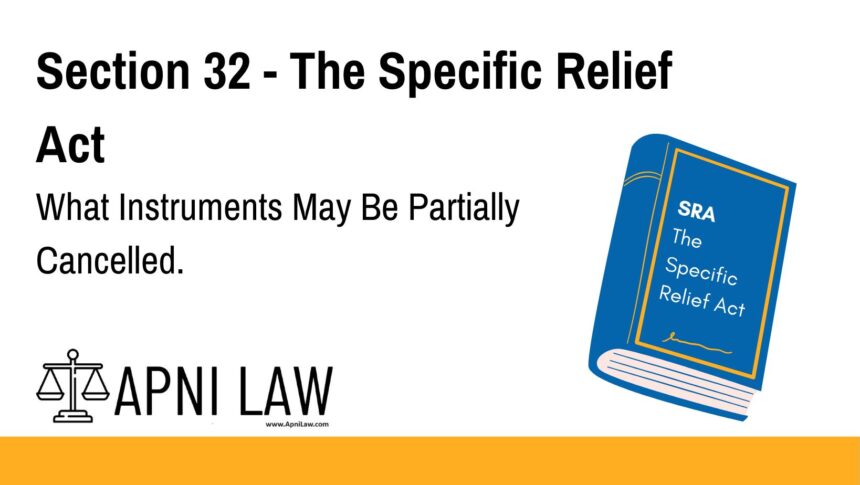Code: Section 32 – The Specific Relief Act
Section 32.
Where an instrument is evidence of different rights or different obligations, the court may, in a proper case, cancel it in part and allow it to stand for the residue.
Explanation of Section 32 – The Specific Relief Act
Overview
Section 32 of The Specific Relief Act provides that when an instrument (such as a contract, deed, or agreement) serves as evidence of different rights or obligations, the court has the discretion to partially cancel the instrument. This ensures that only the problematic or unenforceable portions of the document are invalidated while allowing the remaining valid sections to remain effective.
Key Provisions
- Partial Cancellation: If an instrument contains multiple distinct rights or obligations, the court may cancel only the part of the instrument that is problematic or unenforceable, while leaving the remainder intact.
- Proper Case: The power of partial cancellation is at the discretion of the court, which will decide whether it is appropriate based on the facts and circumstances of the case. This ensures that the remedy is used justly and appropriately, without unjustly affecting the valid portions of the document.
Illustration
Example 1: Contract with Multiple Clauses
A business contract includes several clauses, some of which are legally invalid due to misrepresentation. The court, under Section 32, can cancel the invalid clauses while allowing the remaining clauses of the contract to remain in force.
Example 2: Deed of Transfer with Conditions
A deed of property transfer includes a condition that is considered illegal, but the transfer of ownership is valid. The court may cancel only the illegal condition and allow the transfer of ownership to stand as it is.
Common Questions and Answers on Section 32 – The Specific Relief Act
1. Can the court cancel the entire instrument under Section 32?
- Answer: No, Section 32 only allows the court to cancel parts of the instrument. The remaining parts of the instrument, if valid and enforceable, will continue to stand.
2. In what kind of cases can partial cancellation occur?
- Answer: Partial cancellation can occur when an instrument contains different rights or obligations, and only a specific portion of the instrument is unenforceable or problematic. The court will assess whether it is appropriate to cancel only part of the instrument in such cases.
3. What happens if the instrument is not divisible?
- Answer: If the instrument cannot be separated into distinct rights or obligations, the court may not apply partial cancellation and may instead cancel the entire instrument.
4. How does the court determine which parts of the instrument should be cancelled?
- Answer: The court will evaluate the specific rights or obligations contained in the instrument and determine which sections are unenforceable or invalid, canceling only those parts that are problematic.
5. Is partial cancellation always the best option?
- Answer: Not always. The court will decide whether partial cancellation is appropriate depending on the circumstances and whether doing so will allow the valid parts of the instrument to remain in force.
Conclusion
Section 32 of The Specific Relief Act allows for partial cancellation of instruments that involve different rights or obligations. This provision helps ensure that only the problematic sections of a document are invalidated, while preserving the enforceability of the remaining valid portions. The discretion granted to the court in this matter ensures fairness and flexibility in legal remedies.







